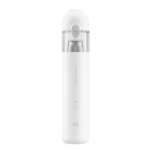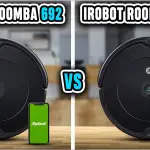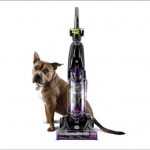Water vacuum cleaners, also known as wet/dry vacuums, offer a multitude of advantages over traditional dry vacuums. These versatile appliances not only clean dry surfaces but also effectively remove liquids, making them ideal for a wide range of cleaning tasks.
One of the primary benefits of water vacuum cleaners is their ability to clean both hard and soft surfaces. The water-based filtration system traps dirt, dust, and allergens, leaving surfaces spotless. Additionally, the water filter helps to eliminate odors, creating a fresher and healthier indoor environment.
Water vacuum cleaners are particularly effective for cleaning carpets and upholstery. The water-based filtration system gently agitates the fibers, removing deep-seated dirt and stains without damaging the fabric. This makes them an excellent choice for homes with pets or children, as they can effectively remove pet hair, dander, and spills.
Furthermore, water vacuum cleaners are ideal for cleaning hard-to-reach areas. The flexible hose and attachments allow users to easily clean under furniture, behind appliances, and in other tight spaces. This versatility makes them a valuable tool for thorough cleaning.
Another advantage of water vacuum cleaners is their ability to clean water tanks. By attaching the vacuum to the tank, users can quickly and efficiently remove water and debris, ensuring the tank remains clean and hygienic. This is particularly beneficial for homes with humidifiers or air conditioners, as it helps to prevent mold and bacteria growth.
In addition to their cleaning capabilities, water vacuum cleaners also offer several health benefits. The water filter traps allergens and dust mites, reducing the risk of respiratory problems. Moreover, the water-based filtration system helps to eliminate odors, creating a more pleasant and comfortable living environment.
Overall, water vacuum cleaners provide a comprehensive cleaning solution for homes and businesses. Their versatility, effectiveness, and health benefits make them an excellent choice for a wide range of cleaning tasks. Whether you need to clean carpets, hard floors, or water tanks, a Water Vacuum Cleaner is an indispensable tool that will leave your surfaces spotless and your indoor environment healthier.

How to Choose the Right Vacuum Cleaner to Clean Your Water Tank
Maintaining a clean water tank is crucial for ensuring the optimal performance of your appliances and safeguarding your health. Vacuum cleaners specifically designed for water tank cleaning offer a convenient and effective solution.
When selecting a Water Vacuum Cleaner, consider the following factors:
Suction Power: The suction power determines the vacuum’s ability to remove water and debris from the tank. Look for models with a high suction rating to ensure thorough cleaning.
Water Capacity: The water capacity indicates the amount of water the vacuum can hold before requiring emptying. Choose a vacuum with a capacity that aligns with the size of your water tank.
Attachments: Specialized attachments, such as crevice tools and brushes, enhance the vacuum’s versatility and allow you to reach hard-to-access areas within the tank.
Filtration System: A high-quality filtration system is essential for capturing impurities and preventing them from recirculating into the air. Look for vacuums with HEPA filters or similar advanced filtration technologies.
Ease of Use: Consider the vacuum’s weight, maneuverability, and ease of emptying. A lightweight and ergonomic design makes cleaning more convenient.
Additional Features: Some water vacuum cleaners offer additional features, such as automatic shut-off when the water tank is full or the ability to vacuum both wet and dry surfaces. These features can enhance the vacuum’s functionality and convenience.
Water In Vacuum Cleaner:
If water accidentally enters your vacuum cleaner, it’s crucial to act promptly to prevent damage. Immediately unplug the vacuum and empty the water tank. Allow the vacuum to dry thoroughly before using it again.
Vacuum Cleaner With Water:
Certain vacuum cleaners are designed to handle both wet and dry surfaces. These models are ideal for cleaning water spills or other wet messes. Ensure that the vacuum is equipped with a water-resistant filter and follow the manufacturer’s instructions for wet cleaning. Agitator vs No Agitator Washing Machines: Which is Better?
Water Filter Vacuum Cleaner:
Water filter vacuum cleaners utilize a water filtration system to trap dust and allergens. This type of vacuum is particularly beneficial for individuals with allergies or respiratory sensitivities. The water filter captures impurities, preventing them from being released back into the air.
By carefully considering these factors, you can select the right Water Vacuum Cleaner to effectively clean your water tank and maintain a healthy and hygienic environment.

What to Do If Water Gets into Your Vacuum Cleaner
Water ingestion in vacuum cleaners can be a common occurrence, leading to potential damage or malfunction. Understanding the consequences and appropriate actions to take is crucial for maintaining the longevity and functionality of your vacuum cleaner.
Consequences of Water Ingestion
Water entering the vacuum cleaner can cause several issues. It can damage the motor, electrical components, and filters, resulting in reduced suction power, overheating, or even complete failure. Additionally, water can promote mold and mildew growth, creating an unpleasant odor and potentially compromising indoor air quality.
Immediate Actions
If water gets into your vacuum cleaner, it is essential to take immediate action to minimize damage.
- Unplug the vacuum cleaner: Disconnect it from the power source to prevent electrical hazards.
- Empty the water tank: If your vacuum cleaner has a water tank, empty it immediately to remove excess water.
- Remove the filters: Take out the filters and inspect them for water damage. If they are wet, replace them with dry ones.
- Dry the vacuum cleaner: Use a clean cloth or paper towels to absorb any remaining water from the vacuum cleaner’s interior.
Further Steps
After taking immediate actions, it is advisable to follow these additional steps:
- Inspect the motor: Check the motor for any signs of water damage, such as rust or corrosion. If necessary, contact a qualified technician for repairs.
- Clean the electrical components: Use a soft brush or compressed air to remove any water or debris from electrical components.
- Dry the vacuum cleaner thoroughly: Allow the vacuum cleaner to air dry completely before reassembling it. This may take several hours or even days.
Preventing Water Ingestion
To prevent water ingestion in the future, consider the following tips:
- Avoid vacuuming wet surfaces: Use a mop or cloth to clean up spills before vacuuming.
- Empty the water tank regularly: If your vacuum cleaner has a water tank, empty it after each use to prevent overflow.
- Use a water filter: A water filter can help remove water from the air before it reaches the vacuum cleaner’s motor.
- Consider a Water Vacuum Cleaner: If you frequently need to clean up water spills, consider investing in a Water Vacuum Cleaner specifically designed for this purpose.
By following these guidelines, you can effectively address water ingestion in your vacuum cleaner and maintain its optimal performance for years to come.

The Advantages of Using a Vacuum Cleaner with Water
Vacuum cleaners with water filtration systems offer a multitude of benefits that make them an excellent choice for maintaining a clean and healthy home. Unlike traditional vacuum cleaners that rely on dry filters, water vacuum cleaners utilize a water-filled chamber to trap dirt, dust, and allergens. This innovative technology provides several advantages that enhance the cleaning experience.
Firstly, water vacuum cleaners are highly effective at removing fine particles and allergens from the air. The water acts as a natural filter, capturing even the smallest particles that can cause respiratory problems. This makes them ideal for homes with individuals suffering from allergies or asthma. Additionally, the water filtration system prevents dust from being recirculated into the air, ensuring a cleaner and healthier indoor environment. Clorox Bathroom Cleaner, Best Review
Another advantage of water vacuum cleaners is their ability to clean both hard floors and carpets. The water-based filtration system effectively removes dirt and debris from hard floors, leaving them sparkling clean. For carpets, the Water Vacuum Cleaner‘s gentle suction and water-based cleaning action help to lift dirt and grime from deep within the fibers, resulting in a thorough and refreshing clean.
Furthermore, water vacuum cleaners are environmentally friendly. They eliminate the need for disposable filters, reducing waste and contributing to a more sustainable cleaning routine. The water used in the filtration process can be easily disposed of down the drain, making them a convenient and eco-conscious choice.
Moreover, water vacuum cleaners are easy to maintain. The water chamber can be emptied and refilled with fresh water after each use, ensuring optimal performance. Additionally, the water filtration system helps to prevent clogs and blockages, reducing the need for frequent maintenance.
In conclusion, water vacuum cleaners offer a range of advantages that make them an excellent choice for maintaining a clean and healthy home. Their ability to effectively remove allergens, clean both hard floors and carpets, and be environmentally friendly make them a superior alternative to traditional vacuum cleaners. By investing in a Water Vacuum Cleaner, homeowners can enjoy a cleaner, healthier, and more sustainable cleaning experience.
How to Use a Water Filter Vacuum Cleaner
Water filter vacuum cleaners, also known as wet/dry vacuums, offer a versatile solution for cleaning both wet and dry messes. Unlike traditional vacuum cleaners, they utilize a water filtration system to trap dirt, dust, and allergens, providing a more thorough and hygienic cleaning experience.
Benefits of Water Filter Vacuum Cleaners
- Enhanced Filtration: The water filtration system effectively captures fine particles, including dust mites, pollen, and pet dander, improving indoor air quality.
- Wet/Dry Cleaning: These vacuums can handle both wet and dry spills, making them ideal for cleaning carpets, hard floors, and even outdoor areas.
- Odor Control: The water filter traps odors, leaving your home smelling fresh and clean.
- Hypoallergenic: Water filter vacuum cleaners are hypoallergenic, making them suitable for individuals with allergies or respiratory conditions.
How to Use a Water Filter Vacuum Cleaner
- Fill the Water Tank: Fill the water tank with clean water to the indicated level.
- Attach the Filter: Insert the water filter into the designated compartment.
- Choose the Appropriate Nozzle: Select the appropriate nozzle for the surface you are cleaning.
- Start Vacuuming: Turn on the vacuum cleaner and begin cleaning.
- Empty the Water Tank: When the water tank is full, empty it into a sink or toilet.
- Clean the Filter: Rinse the water filter regularly to maintain its effectiveness.
Tips for Using a Water Filter Vacuum Cleaner
- Use Distilled Water: Distilled water prevents mineral buildup in the water tank and filter.
- Clean the Filter Regularly: A clean filter ensures optimal performance and filtration.
- Empty the Water Tank Frequently: Emptying the water tank prevents overflow and maintains suction power.
- Avoid Vacuuming Sharp Objects: Sharp objects can damage the water filter.
- Store Properly: Store the vacuum cleaner in a dry place when not in use.
Conclusion
Water filter vacuum cleaners offer a superior cleaning experience by effectively removing dirt, dust, and allergens from both wet and dry surfaces. Their hypoallergenic nature and odor control capabilities make them an excellent choice for homes with allergies or respiratory conditions. By following the proper usage and maintenance guidelines, you can ensure that your Water Filter Vacuum Cleaner provides optimal performance and a healthier indoor environment.
Q&A
What is a Water Vacuum Cleaner?
A Water Vacuum Cleaner is a type of vacuum cleaner that uses water to clean surfaces.
What is a Vacuum Cleaner To Clean Water Tank?
A Vacuum Cleaner To Clean Water Tank is a device that is used to clean the water tank of a vacuum cleaner.
What happens if water gets in a vacuum cleaner?
If water gets in a vacuum cleaner, it can damage the motor and other components.
Can you vacuum with water?
Yes, you can vacuum with water using a Water Vacuum Cleaner.
What is a Water Filter Vacuum Cleaner?
A Water Filter Vacuum Cleaner is a type of vacuum cleaner that uses a water filter to trap dirt and dust.




